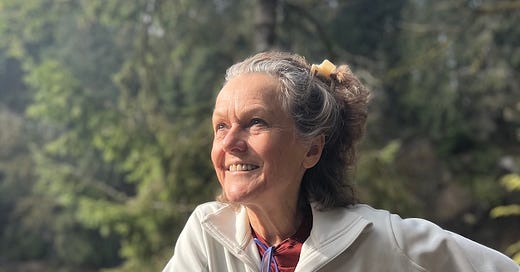How to Exert Some Influence in This Mixed-Up World
Lisa Renstrom on Using Everyday Money Decisions to Drive Change
It is hard to say which is more uncomfortable: witnessing what has been happening in the United States recently—or feeling powerless to do much about it.
But here’s some good news: A growing number of people have been quietly creating ways for us to drive social change through everyday decisions about what to do with our money.
Meet Lisa Renstrom, one of the most optimistic, creative, and delightful people I know. She has spearheaded this for over a decade.
Though she would be too humble to acknowledge this, I see her as a model of ordinary heroism in these extraordinary times: someone acting with courage and integrity to make a positive difference for others.
Over three decades as a leader in the environmental, social justice, investment, and philanthropy sectors, Lisa has served as President of the National Sierra Club and Rachel’s Network and Chair of Confluence Philanthropy.
Her third act, she says, is focused on helping people direct money to good causes.
“In 2014, I convinced many people to divest from fossil fuels to stigmatize the fossil fuel industry and to say these assets will become stranded,” she recalls. “I said we need to divest from them and move to a new energy system.
“Many people came back to me and said, ‘That's great, but my financial advisor has no clue how to invest fossil-free. “So, we created a platform called Values Advisor that enables people to find a financial advisor to help them invest with their values.
“It's like a Match.com for investors who want to align their money with their values. And because it is a nonprofit, it's distributed to many affinity groups that seek both a financial and a social return,” says Renstrom, President and co-founder of Values Advisor.
Exerting Power Through Money
The point is that investing isn’t only about returns; it’s about impact. Whether you prioritize climate action, racial equity, or sustainable agriculture, your investment decisions can help shift entire industries toward responsible business practices.
Or as Renstrom puts it: “You can invest in sugar water, or you can invest in businesses creating products that align with your values.”
“It’s exciting for people to realize that investing with impact is possible,” she adds. “It’s an incredible way to feel powerful. Your 401(k), savings, and bank–every financial choice matters and has an impact.”
5 Tips from Financial Experts
Values Advisor and Invest for Better (a nonprofit that helps women take control of their assets and use them to influence things they care about) cosponsored an event last week that explored how to create positive social and environmental outcomes through how you invest your cash.
Here are some of their tips:
1. Develop a Values-Based Strategy for Wealth
“Start by identifying your ‘why’? What matters most to you? Build your investment strategy around that,” said Kathleen McQuiggan, portfolio manager for Brown Advisory.
2. Know How Much Cash to Keep On-Hand
“Imagine your worst-case scenario. How much cash would you need to feel secure during uncertain times?” said Anne Johnson, Founder and Managing Director of Created Wealth Advisory. Some general guidelines:
2 to 3 months of expenses: Keep in a local credit union or values-aligned bank.
3 to 6 months: Use money markets with mission-driven institutions.
6 months to 1 year: Consider community loan funds or social impact investments.
3. Move Savings or Checking Accounts to Mission-Driven Banks
“Anyone can move their bank. It doesn’t matter how much money you have or don’t have,” said Janine Firpo, Co-Founder of Invest for Better. Here are three they mentioned.
First Women’s Bank aims to empower women economically.
Hope Credit Union supports Black-led communities.
Latino Community Credit Union empowers immigrant and Hispanic communities.
4. Support the Next Generation
Engage the next generation in discussions around money, values, and philanthropy to ensure your legacy supports the causes and communities you care about.
“Cash plays a powerful role in intergenerational wealth. How you pass it on matters,” said Anne Johnson, Founder and Managing Director of Created Wealth Advisory.
5. Start Small, Grow Big
Open a savings account with a mission-driven bank.
Reallocate your 401(k) or retirement funds to ESG-aligned portfolios.
Use platforms like Values Advisor to find financial advisors who match your ethical investing priorities.
Cutting Through Powerlessness
In the model of ordinary heroism in extraordinary times that I teach, the ordinary heroism part comes relatively easily for many mission-driven leaders and teams. People who do this work tend to act naturally with courage, integrity, and altruism.
But every hero faces challenges. And in today’s extraordinary world, characterized by multiple crises, complexity, and unprecedented rates of change–and now, a slew of setbacks on issues vital to our collective well-being–one of those challenges is how tempting it is to feel powerless, that we have few levers at our disposal to be a positive influence.
Lisa Renstrom’s work joyously dismantles that temptation by making it much easier for people to use money (to whatever extent it is available) as power.
In her words, the bottom line is: “Wherever you put your money, that’s where things grow. If we all invested in companies creating the world we want to see, that’s the world we would get.”
Workshop Offering: Mission-driven leaders and teams aren’t just facing setbacks—they’re navigating discouragement, overwhelm, and uncertainty about their impact. My half-day capacity-building workshop helps them regain clarity and resilience to continue their critical work. If this could support your team, let’s connect—I’d love to learn more about your needs.




